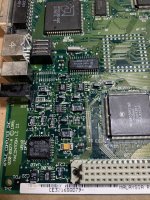I read everywhere that you should preventively recap all old Macs. This process is complex and takes time and expertise that I don’t have. There is also the question about what to recap, analog board? Motherboard? PSU ? All of them ?
I the perspective of finding the sweet spot between effort/cost and risk of damage to the computer would it make sense to recap only components that, if they explode, may cause great damage and leave the others alone and change them only when they break down?
if yes what would be the elements that definitely needs to be recapped?
I the perspective of finding the sweet spot between effort/cost and risk of damage to the computer would it make sense to recap only components that, if they explode, may cause great damage and leave the others alone and change them only when they break down?
if yes what would be the elements that definitely needs to be recapped?
Last edited by a moderator:

